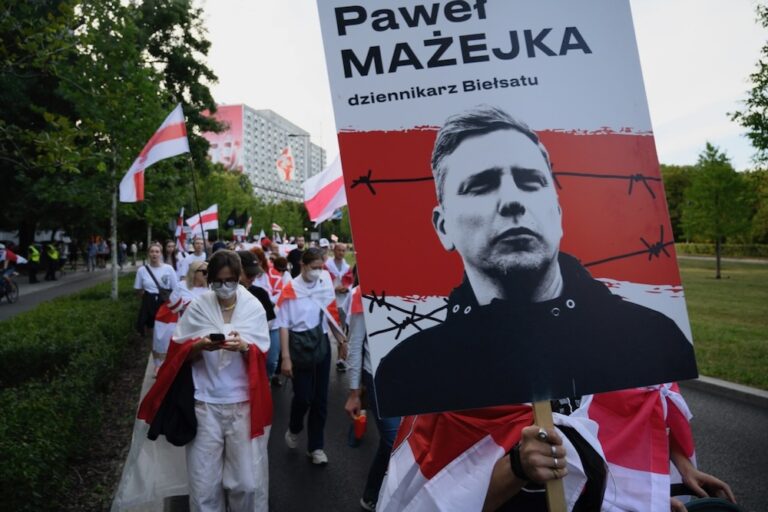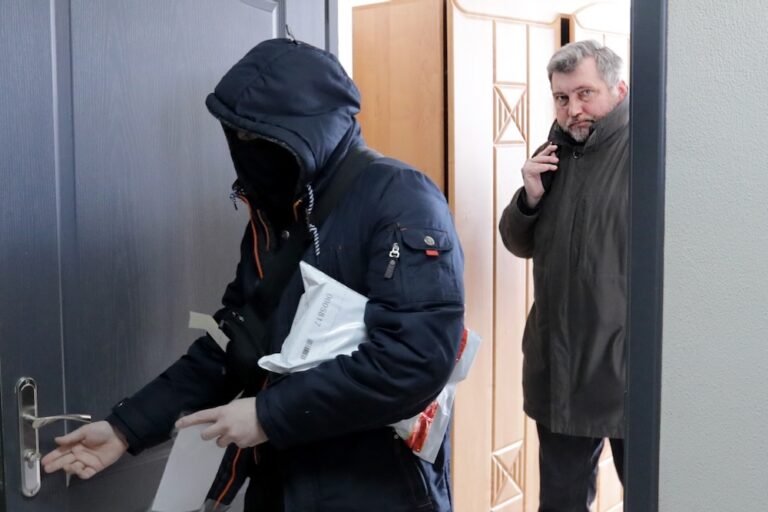(RSF/IFEX) – RSF has accused Belarusian authorities of denying the population the right to independent news in the run up to elections, after they announced the permanent closure of the opposition weekly “Rabochaya Solidarnost” on 2 August 2004 and suspended printing of the independent daily “Narodnaya Volya” on 4 August. The Information Ministry said “Rabochaya […]
(RSF/IFEX) – RSF has accused Belarusian authorities of denying the population the right to independent news in the run up to elections, after they announced the permanent closure of the opposition weekly “Rabochaya Solidarnost” on 2 August 2004 and suspended printing of the independent daily “Narodnaya Volya” on 4 August.
The Information Ministry said “Rabochaya Solidarnost” would have to remain closed because the Supreme Court had dissolved the Belarus Labour Party (PBT), one of the newspaper’s co-founders, while printing of “Narodnaya Volya” was ordered suspended until it paid damages to a former head of the state television and a businessman.
RSF said these two decisions constituted further serious attacks on an independent press that was already subject to widespread harassment in Belarus. “Every means possible is being used to silence voices that are not in harmony with the president’s way of thinking,” the organisation said.
The Krasnaya Zvezda (Red Star) printing house received an order to stop printing “Narodnaya Volya” on 4 August, a day after a regional court confiscated equipment belonging to the newspaper. Editor-in-chief Iosif Seredich said at a 5 August press conference that the value of the equipment and material seize was more than the damages claimed by businessman Sergei Atroschenko, although this was the reason given for the seizure.
The newspaper is also required to retract allegations made about former state TV director Yahor Rybakov, who is being detained on corruption charges and has been in prison for several months. The state prosecutor’s office has announced that it will retrieve US$500,000 from Ryabakov on the grounds that it was illegally obtained. One hundred thousand dollars have already been seized. “And yet we have to publish an article saying he is the world’s most honest man,” Seredich complained.
On 31 May, the Belarus Supreme Court confirmed a 17 November 2003 lower court decision ordering “Narodnaya Volya” to pay Ryabakov 20,000 euros (approx. US$24,500) in damages for libel because of an October 2001 interview with Eleonora Yazerskaya, in which she accused him of mismanagement.
The other newspaper, “Rabochaya Solidarnost”, was originally suspended for three months by the information minister, on 3 June 2004, for “violating the media law” by allegedly failing to update its registration details with the authorities. The Information Ministry now argues that the newspaper has “ceased to exist” because of the Supreme Court’s dissolution of the PBT, one of the organisations that founded the paper.
PBT leader Alexandre Bukhvostov told RSF that the newspaper was the target of official hostility because it criticised the pro-government Federation of Belarus Trade Unions.
In its 2004 annual report, RSF condemned the administrative harassment of the independent press, who are seen by authorities as too critical of President Lukashenko’s regime. The organisation named Lukashenko as one of the 37 “predator of press freedom” worldwide.
During 2003, the authorities suspended and repeatedly sanctioned more than 10 newspapers, obstructed operations in about 15 independent media outlets, and shut down several human rights organisations that were providing the media with a valuable service.


